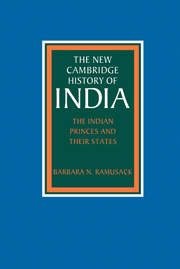Book contents
- Frontmatter
- 1 Introduction: Indian princes and British imperialism
- 2 Princely states prior to 1800
- 3 The British construction of indirect rule
- 4 The theory and experience of indirect rule in colonial India
- 5 Princes as men, women, rulers, patrons, and Oriental stereotypes
- 6 Princely states: administrative and economic structures
- 7 Princely states: society and politics
- 8 Federation or integration?
- Bibliographical Essay
- Glossary
- Index
- THE CAMBRIDGE HISTORY OF INDIA
- References
8 - Federation or integration?
Published online by Cambridge University Press: 28 March 2008
- Frontmatter
- 1 Introduction: Indian princes and British imperialism
- 2 Princely states prior to 1800
- 3 The British construction of indirect rule
- 4 The theory and experience of indirect rule in colonial India
- 5 Princes as men, women, rulers, patrons, and Oriental stereotypes
- 6 Princely states: administrative and economic structures
- 7 Princely states: society and politics
- 8 Federation or integration?
- Bibliographical Essay
- Glossary
- Index
- THE CAMBRIDGE HISTORY OF INDIA
- References
Summary
By 1929 Indian princes and nationalists were mutually frustrated with British policies. The princes smarted from the refusal of the Indian States Committee to define paramountcy and thereby limit the extent of British intervention in their states. Indian nationalists were angered by the appointment of an Indian Reforms Commission that included no Indian members to investigate the operation of the 1919 reforms. The public demonstrations against the Commission, colloquially known as the Simon Commission after its chair, Sir John Simon, during its tour in India indicated that it would not be business as usual. In a bold move that consigned the Commission's report to the archives, Lord Irwin persuaded Ramsey MacDonald, the Prime Minister, to convene a Round Table Conference in London in 1930. Representatives of all British and Indian parties would be invited to discuss the future constitutional relationship between Britain and India. For the first time, representatives of the Indian princes would participate in such deliberations. Although the prime goal of the British was to channel elite Indian opposition into constitutional debates away from mass protests, the Round Table Conference also put the final nail in the coffin of the British policy of isolating the princes from each other and from British Indian leaders.
Princely participation in the Round Table Conference shows that neither the British nor the Indian nationalists considered the princes to be political ciphers or puppets. Although the British wanted the princes to counter the Indian nationalists, they did not pull the strings that triggered princely support for or later opposition to federation with British Indian provinces.
- Type
- Chapter
- Information
- The Indian Princes and their States , pp. 245 - 274Publisher: Cambridge University PressPrint publication year: 2003



